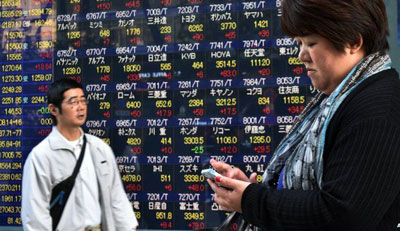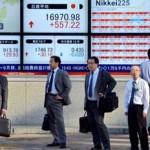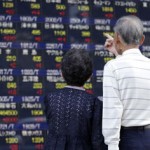Asian Shares Mixed, Falling in Japan But Rising in China

Japan faced worries over the future of quantitative easing, while Property and Brokerage shares surged in China
Shares in Japan fell Monday amid worries that the central bank will be reluctant to expand its easing program in the coming year, while in China, property and brokerage shares surged.
Japan’s Nikkei Stock Average fell 1.7%, adding to its 1.9% decline on Friday when the Bank of Japan announced tweaks to its current bond buying program. Analysts said the measures didn’t amount to a clear expansion of the program, and the central bank said the steps were an adjustment rather than an extension.
The Nikkei is on track to fall 5.5% this month, the second-worst performing stock benchmark in the region after Thailand’s SET, which is down 6.5%.
The Shanghai Composite Index, on track to gain 5.3% this month, was up 1.4% to 3627.81, trading at its highest levels in nearly a month.
Chinese stocks got a boost from a surge in property shares as a fight unfolded between Wang Shi, chairman of China Vanke Co., the country’s largest property firm, and the firm’s new largest shareholder, a group of investors who have made an unsolicited effort to take control of Vanke.
In Shenzhen, Financial Street Holding Co. Ltd. shares were up 9.7%, compared with a 0.5% for the broader index. In Shanghai, Gemdale Corp. was up 10% and Poly Real Estate Group Co. Ltd. gained 5.4%. Authorities set a 10% daily movement limit for mainland listings.
Analysts say the corporate fight over China Vanke, which said it has plans to issue an undisclosed number of new shares, has boosted expectations that the property sector will remain attractive for big fund managers. Vanke’s announcement on Friday amounted to a poison-pill defense against the takeover attempt. Shares of Vanke, which halted trading on Friday, remain suspended in Hong Kong and Shenzhen. Vanke said on Sunday it would release details about its plan before Jan. 18.
Recent stake increases in financial blue chips are also boosting sentiment in China—brokerage firms were up including Citic Securities and GF Securities, which gained than 3%.
“Insurance firms have allocated more capital in financial blue chips” and “this could be the catalyst for inflow of new funds by year-end,” said Xiao Shijun, an analyst at Guodu Securities. Among deals by insurers earlier this month, Anbang Insurance Group raised its stake in Sino-Ocean Land Holdings, and acquired a 5% stake in China Vanke.
Elsewhere on Monday, Hong Kong’s Hang Seng Index was up 0.3%, Australia’s S&P/ASX 200 was up 0.1% and South Korea’s Kospi gained 0.2%.
Trading was lackluster as optimism around the Fed’s decision Wednesday to raise interest rates for the first time in almost a decade faded. Global markets initially rose, as many interpreted the move as a signal of strength in the U.S. economy. Those gains have since dissipated, as concerns about a climbing U.S. dollar and pressure on oil prices return to the forefront.
“Shares should see their normal Santa Claus rally into year-end,” given that the first interest rate increase by the Fed is out of the way, wrote Shane Oliver, investment strategist at AMP Capital in a note. “But as we have seen in the last few days it’s likely to be a bumpy ride.”
On Friday, the Bank of Japan enhanced its quantitative easing program by saying it would buy longer dated bonds and expand an ETF purchases program by ¥300 billion ($2.48 billion) a year.
But analysts said the moves were trivial compared with the size of its current easing measures. Mr. Oliver added that the Bank of Japan move “may have backfired to the extent that it added to investor fears that the BOJ is not really prepared to do more.”
U.S. shares dropped sharply on Friday, sending the Dow Jones Industrial Average to its lowest close since October.
The Japanese yen was down 0.1% at ¥121.20 per U.S. dollar. The local currency had risen as much as 1% against the U.S. dollar late Friday, after the Bank of Japan’s moves.
In other currencies, China’s central bank guided the onshore yuan stronger against the U.S. dollar, breaking 10-straight sessions of setting the reference rate weaker. The onshore yuan can trade 2% above or below the daily fix.
The bank set the fix at 6.4753 against the U.S. dollar earlier. The onshore yuan stayed near its weakest level since 2011, last at 6.4793 to the U.S. dollar compared with 6.48 late Friday.
In Tokyo, shares of Toshiba Corp. plunged 10% after the firm said it is likely to post a net loss of roughly ¥500 billion in the current fiscal year, owing to heavy restructuring costs after an accounting scandal. Toshiba is set to disclose plans to restructure money-losing businesses later Monday. The Wall Street Journal earlier reported the loss, citing a person familiar with the matter.
In Hong Kong, shares of Fosun International Ltd. were up 2.3%, even as the flagship of Chinese conglomerate Fosun Group, said Sunday it had withdrawn its bid for London merchant bank BHF Kleinwort Benson. The parent company, whose chairman Guo Guangchang had disappeared for several days two weeks ago, has many public listings in Hong Kong and the mainland. The news had sent shares of Fosun down more than 10% in recent days.
The company has said Mr. Guo was assisting in government investigations unrelated to the company, and the chairman had since reappeared at a company event last Monday.
Brent crude oil was last down 1.1% at $36.46 a barrel.
Gold prices edged up 0.4% to $1,068.80 a troy ounce.
Source: WSJ – Asian Shares Mixed, Falling in Japan But Rising in China





























